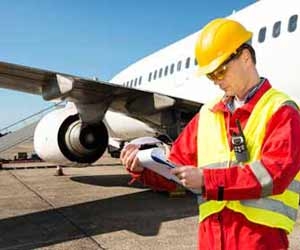Airline Inspector Jobs
Airline inspector jobs can refer to many different kinds of inspectors. Inspectors are often very specific in the types of inspections they make, and are often hired on the basis of their past experience in certain fields.

Inspectors may be used just to inspect parts to insure their quality, or they may inspect aircraft for problems, or possibly inspect a maintenance project performed on an aircraft. Inspectors have often been pilots previously – and they continue to fly to increase or maintain their own expertise.
As more aircraft are expected to take to the skies in the near future, if the economy does well, there will be an increased need for a greater number of inspectors. Aircraft safety depends on aircraft and parts being inspected frequently and ensuring that pilots are sufficiently trained to operate the aircraft safely. There is availability for promotion within the field.
Job Responsibilities
The job responsibilities of an airline inspector are varied and it will often depend on location and the company involved. Some inspectors will periodically inspect the abilities of the pilots of an airline, or of their mechanics and other personnel working for the company. They will also inspect an aircraft to determine its worthiness to fly, and of the systems that the aircraft uses. Other inspectors will examine an airline’s facilities, procedures and equipment. All of these are necessary to ensure the best safety and maintenance of the terminals, buildings, aircraft and crew members, and passengers.
Did You Know? There are only about 170 schools that are approved by the FAA where an A&P license can be obtained.
Airline inspectors are employed by the Federal Aviation Administration to ensure the safety of every aircraft that leaves the ground. They must enforce FAA standards for safety, maintenance, and other flight protocols. Inspectors perform routine safety checks and are also called in to investigate accidents or violations. There are different types of inspectors dealing with pilots, maintenance, accidents, and avionics equipment.
Job Requirements
It is possible that the airline may assign you to a domicile, and you may be moving around quite a bit. Travel may be expected for some type of inspectors, and you may often work with different people, different schedules, and possibly even different aircraft. At times, you may need to lift aircraft parts which could weigh about 45 pounds. Some airline inspectors will work outside in all kinds of weather – at times. You also may need to be willing to work on any shift.
You will need to be very familiar with the Federal Aviation Rules (FAR’s), and can understand and interpret them. You will need to have a second class FAA medical certificate. As far as flying goes, you will probably need at least 1,500 flying hours, a valid Flight Instructor Certificate, and at least 100 flight hours within the last three years. Being able to speak in front of groups is essential, and you will need to be proficient in writing, too. If you are an aircraft inspector, you must be experienced with the type of aircraft or maintenance that you will be inspecting.
Training & Degrees
Airline inspectors are hired because they already have the required experience and knowledge necessary to do the job. While the requirements will certainly depend on the type of inspector you are applying for, you may also need to have experience or training in investigations, surveillance, certification, and enforcement. Those working to inspect helicopters for emergencies may also need to know about emergency helicopter services.
Applying for an airline inspector job will require that you fill out the Knowledge, Skills and Abilities (KSA) government form. Successfully passing a background investigation that goes back at least 10 years is mandatory, and so is passing drug tests. A flight line inspector will need to have an A&P certificate. A H.S. Diploma or GED is often the only educational requirement, but military experience is preferred – possibly five years with complex jet aircraft.
Salary & Benefits
Since airline inspector jobs are usually government jobs, the benefits are going to be good. You can expect medical, dental and vision coverage, life insurance, paid vacations, a 401k, long-term care, flexible spending accounts, and more. Relocation is often not included for those just getting into the field. There may also be a one year probation period.
This job will often require a lot of overtime, which could greatly increase your annual income. The total salary runs between $39,500 and over $89,000.
Quick Summary of Airline Inspector Employment:
- All airline inspectors are approved by the FAA.
- You must be licensed to fly and have more than 100 hours in the last 3 years.
- Extensive military flight and mechanic experience is preferred.
- Pay and benefits for airline inspectors is good.


 Teach English in Asia
Teach English in Asia  Cruise Ship Jobs
Cruise Ship Jobs  Alaska Fishing Industry Jobs
Alaska Fishing Industry Jobs  Sharing Economy / Gig Economy
Sharing Economy / Gig Economy